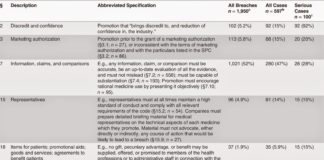 Recently, Pfizer ran a long animated TV ad for Celebrex that made many claims within the 2 and a half minute running time. But were these claims accurately understood by viewers? To find out, I decided to follow the ad’s suggestion and “dive deeper” by hosting a little poll on this blog (see “The New Celebrex TV Ad: What Did You Learn?“). I will dive deeper and review the results of that poll here.
Recently, Pfizer ran a long animated TV ad for Celebrex that made many claims within the 2 and a half minute running time. But were these claims accurately understood by viewers? To find out, I decided to follow the ad’s suggestion and “dive deeper” by hosting a little poll on this blog (see “The New Celebrex TV Ad: What Did You Learn?“). I will dive deeper and review the results of that poll here.
The polled asked “Which claims were made in the New Celebrex TV Ad?” and respondents could check off claims from the following list:
- Rx naproxen and ibuprofen have CV risks.
- FDA requires all NSAIDs, including Celebrex, to have same CV warning.
- Celebrex use may lead to heart attack or stroke, even death.
- Celebrex, unlike naproxen or ibuprofen, does not cause stomach bleeding.
- Celebrex has never been taken off the market.
- FDA says Celebrex’s benefits outweigh the risks for most patients.
- Unlike other NSAIDs, Celebrex can be used with lose-dose aspirin.
- Risk of CV events increases when Celebrex is taken for long periods.
- Celebrex may cause stomach bleeding, which can lead to death.
- Studies show Celebrex is a better option than naproxen or ibuprofen for pain relief in elderly patients.
Regarding CV Risks of NSAIDs
While a majority of respondents believed the ad claimed that Rx naproxen and ibuprofen have CV (cardiovascular) risks, the ad actually said that “based on available evidence” the risk was “unclear” (Quote: “When it comes to relieving arthritis pain, you may think some prescription NSAID pain relievers like ibuprofen and naproxen don’t have any cardiovascular risks. But based on available research that’s not clear.” Unquote).
While it may be unclear that naproxen and ibupofen and Celebrex have cardiovascular risks, it is TRUE that “FDA requires all NSAIDs, including Celebrex, to have same CV warning.” That was clearly stated in the ad and everyone got the message.
Not everyone, however, got the message that “Celebrex use may lead to heart attack or stroke, even death.” The ad says “Any prescription NSAID, including Celebrex, may increase the chance for heart attack and stroke, which can lead to death.”
Five respondents were fooled into believing the ad said that “Celebrex, unlike naproxen or ibuprofen, does not cause stomach bleeding” when, in fact, no such claim was made. The ad said “All NSAIDs, including Celebrex, also increase the chance of serious skin reactions or stomach and intestine bleeding and ulcers, which…may cause death.”
The mention of “death” due to side effects two times in the ad was striking. You’ll not hear that word in very many ads.
Everyone correctly got the message that Celebrex has never been taken off the market. Although that’s faint praise, if Vioxx should ever return, I’m sure Pfizer will play the “never taken off the market” card more often in its Celebrex ads.
Most vs. Certain vs. Select
A lot of respondents were fooled into thinking that the ad claimed the FDA said Celebrex’s benefits outweigh the risks for most patients. The ad said the FDA said that for “certain patients Celebrex’s benefits outweigh the risks.” Here’s what the FDA actually said in its COX-2 health advisory: “FDA has concluded that the benefits of Celebrex outweigh the potential risks in properly selected and informed patients” (my emphasis).
A few people thought the ad said that Celebrex was “a better option than naproxen or ibuprofen for pain relief in elderly patients” when, in fact, the ad said “the elderly are increased risk for stomach bleeding and ulcers” when taking any NSAID, including Celebrex.
As for the remaining statements:
- “Risk of CV events increases when Celebrex is taken for long periods” — The ad did state this, although only a minority of respondents remembered that claim.
- “Celebrex may cause stomach bleeding, which can lead to death” — the ad also said this and most respondents, but not all, got the message.
In closing, let me just quote my friend Bruce Grant who made this comment to a Pharmalot posting on this topic:
So let me see if I get the message of this spot…
Those who make it through the two minutes or so of risk information finally get a tiny little coda of benefit message…conveying a tiny little package of benefits that “in some patients…may outweigh the risks.”
1. *Some* studies reported a lower incidence of *some* less-severe GI side effects with Celebrex than with Rx ibuprofen or naproxen. But larger, more recent studies suggest that there is, in fact *no* net GI benefit.
2. Patients on aspirin therapy can take Celebrex, while “many doctors” discourage the use of other Rx NSAIDs in this situation. But wait…the patients on aspirin therapy are those already being treated for cardiovascular disease and presumably at higher risk for subsequent events…so would the itty-bitty possible GI advantages of Celebres (Remember, there are no advantages for COX-2s over other NSAIDs in terms of pain relief.) really outweigh the risks in these particular patients?
I can’t even begin to imagine how much Pfizer is spending on this campaign at 250 seconds of airtime a pop. And by returning to the airwaves, they’ve just plastered a big “Kick Me” sign on their back for Sidney Wolfe, Senator Grassley, Rep. Waxman, et al.
Whoever sold this idea to Pfizer management must be one heck of a salesperson.









![6 Digital Tools at the Center of Healthcare Digitalization [INFOGRAPHIC]](http://ec2-54-175-84-28.compute-1.amazonaws.com/pharma-mkting.com/wp-content/uploads/2021/04/6DigitalTools_600px-100x70.jpg)




